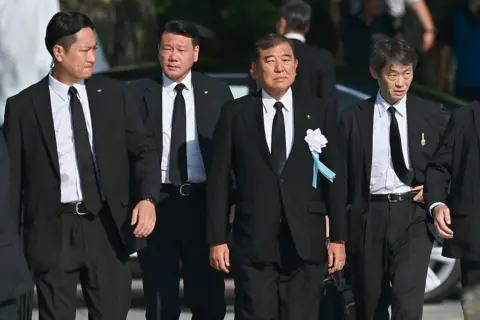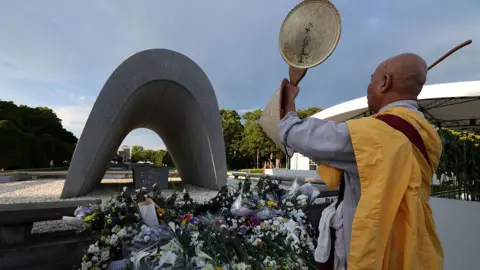Japan correspondent in Hiroshima
BBC News, Singapore
 Gety pictures
Gety picturesA silent prayer was held in Japan on Wednesday morning, when it was 80 years since the United States dropped a atomic bomb in Hiroshima.
Japanese Prime Minister Shigro Ishiba attended the ceremony on Wednesday, along with officials from all over the world and the city’s mayor, Kazome Maczi.
Matsui warned of the accelerated global trend towards military accumulation … [and] The idea that nuclear weapons are necessary for the national defense, saying that this was “flagrant ignorance” [of] The lessons that the international community should learn from the tragedies of history. “
The Second World War ended with the handing over of Japan after dropping the bombs in Hiroshima and Nagasaki.
Bombs killed more than 200,000 people – some of them from the immediate explosion and others from radiation and burn.
The legacy of weapons is still chasing the survivors today.
“My father was burning and deep from the explosion. His skin was hanging from his body – he could not even hold my hand,” Shingo Knight’s survivor of Hiroshima told the BBC. He was six years old when the bomb hit his city, killing his father and younger brothers.
It was Mr. Knito Share his story With a group of students in Hiroshima, who transform his memories of tragedy into art.
In 2024, Nihon Hidankyo, a Japanese group of atomic bombs, won the Nobel Peace Prize for their efforts to rid the nuclear weapons world.
In a speech on Wednesday, Mayor Matsui said that the treaty of nuclear proliferation, which aims to prevent nuclear weapons and enhance the peaceful use of nuclear energy, was “on the verge of job defect.”
He also called on the Japanese government to ratify the Nuclear Weapons Prohibition Treaty – an international agreement prohibiting nuclear weapons that entered into force in 2021.
 Gety pictures
Gety picturesMore than 70 countries have believed the treaty, but nuclear forces such as the United States and Russia opposed them, referring to the deterrent function of nuclear messages.
Japan also rejected such a ban, on the pretext that its security is strengthened by US nuclear weapons.
The nuclear issue is a divisive issue in Japan. In the streets that preceded the Peaceful Park, there were small protests calling for the abolition of nuclear weapons.
Satoshi Tanaka, one of the survivors of the atomic bomb that suffered from multiple cancers from exposure to radiation, said that seeing bloodshed in Gaza and Ukraine today evokes his suffering.
He told the BBC: “Seeing the mountains of the rubble, destroyed cities, and children and women flee in a state of panic, all of this brings memories of what I have passed.” “We live alongside nuclear weapons that can wipe humanity several times.”
“The most urgent priority is to push the leaders of nuclear armed countries. The people of the world should become more angry, raise their voices with a higher voice, and take huge measures.”
https://ichef.bbci.co.uk/news/1024/branded_news/7672/live/0f8c6950-7291-11f0-8dbd-f3d32ebd3327.jpg
2025-08-06 02:05:00














